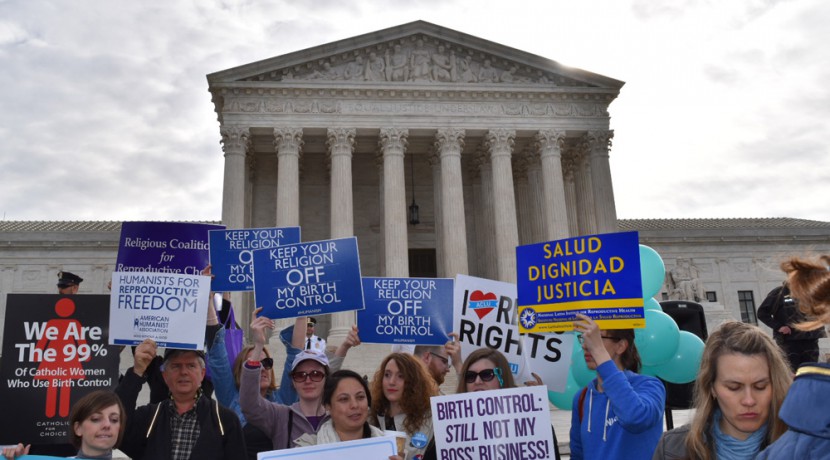Keep Your Religion Off My Birth Control: Humanists Rally at the Supreme Court
Yesterday members and staff of the American Humanist Association joined with other organizations in taking a stand in defense of reproductive rights and the separation of church and state at the front of the US Supreme Court building. The Court heard arguments in the case Zubik v. Burwell, in which seven religious nonprofits, universities, and other organizations argue that they should be given special privilege from the government to ignore the Affordable Care Act’s mandate that employers must provide contraceptives to employees as part of their healthcare.

Jennifer Bardi, editor of the Humanist: The crowd there in support of women's reproductive freedom was lively and diverse. Supporters of the plaintiffs were also out in force. Many of them were nuns sporting signs with the slogan, “Let Them Serve!” They also chanted this periodically. We were scratching our heads wondering exactly what that meant. Let them serve? Serve who? How? AHA intern Ellen Havasy deadpanned that maybe it was a tennis reference. I engaged one of the nuns and asked about the slogan. She explained that if the Supreme Court rules that religiously affiliated organizations have to formally oppose providing contraceptive coverage for their employees (whereby they can get it through another channel), it still violates her religious conscience, and so she and other nuns who help the elderly and poor wouldn’t be able to “serve” in that capacity. So I guess that means they'd just shut down operations. Talking to others, I learned that, more specifically, the Little Sisters of the Poor would be heavily fined if they violate the Affordable Care Act, which would render them unable to serve because they'd have to close up shop. The nun I talked to was very sincere and engaged, and I believed her when she professed a deep love for women who receive her message that birth control is bad for the body and soul. But in my mind she's utterly wrong.
Sincere Kirabo, AHA social justice coordinator: I had a brief conversation with a gentleman on the other side. We couldn't figure out what the “Let them serve!” chant meant, so I was compelled to finally ask. I spoke with a black, mid-to-late 30s-something man in a suit who explained that the chant had to do with the fact that the nuns currently provide “nun duties” (I don't know, whatever they do) to elderly people and that if the Supreme Court decision goes against their favor, they would be fined $30k (can't remember exact figure) for not being in compliance. He said he just wants to support their cause; he wants “religious freedom.” “Our side” was a pretty diverse crowd composed of several different secular, LGBTQ, and religious organizations as well as state and congressional representatives. That kind of unity was a beautiful thing.
Other staffers appreciated the speakers at the rally and its message that birth control is a necessary aspect of healthcare:Meredith Thompson, AHA member services assistant: The rally brought attention to the issue of adequate and accessible health coverage in America, and that some still remain unacquainted with the many different needs birth control serves.
Jessica Xiao, assistant editor of TheHumanist.com: Some of the speakers at the rally really express what a lot of people don't realize about contraceptives—which are not just necessary so women can have sex without worrying about unplanned pregnancy (which is a perfectly reasonable argument for our access to contraception)—hormonal birth control also decreases incidence of hormone-related health issues like ovarian cancer and ovarian cysts.
One rally attendee was impressed by the peacefulness of the demonstrations:Ellen Havasy, AHA graphic design and social media intern: I thought it was pretty peaceful, all things considered (but then again, the protests I'm more used to were on college campuses and often involved anti-choice groups showing up with pictures of mutilated fetuses printed on their signs!)
Another rally attendee commented on how the rally emphasized the need for separation of church and state:Luis Granados, director of Humanist Press: It’s amazing to me the kind of special privileges these religions get away with. Why are they so special? Why don’t they have to obey the same laws I have to obey? They’re not better than me.
Tags: supreme court, Zubik v. Burwell